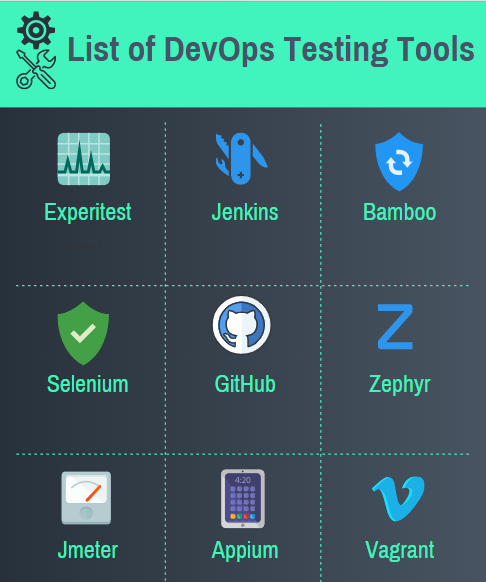
Introduction to DevOps Testing Tools
The following article provides an outline for DevOps Testing Tools. DevOps is advantageous for larger product development projects, in turn, to pick the unaccounted additional areas where a dedicated focus is required to warrant quality product creation and implementation. Apart from development and testing, many other responsibilities must be taken care of so that the product development lifecycle goes smoothly. It helps maintain the agility of the project to keep up the consistency of the development process, as well as deployment planning & timely delivery made easy with DevOps.
List of DevOps Testing Tools
Here are some of the best DevOps testing tools:
1. Experitest
This is a leading platform for cross-browser testing and Phone Applications.
Key Features:
- Execution of large-scale tests.
- Consistent with open source tools along with selenium and Appium.
- DevOps new Appium tests or implement an exciting project.
- Combines with CL tools like TeamCity, Jenkins, and many more.
- Enjoy security and visibility, Enterprise-grade scalability.
2. Jenkins
Jenkins, an open-source automation server, is written in Java. It is a server-based system running on an Apache Tomcat servlet container. It can be used in assignments such as building, developing programs or applications, and testing the software.
Key Features:
- We can easily install it on any platform, such as Linux, Mac OS, and Windows.
- You can efficiently distribute your work beyond the different machines.
- The platform can be configured and set up with ease with the assistance of a user-friendly web interface.
- Jenkins Execution of commands for Shell and Windows are in pre-build steps.
- Here is the link from where you can download the Jenkins: Click here
3. Bamboo
Bamboo is a continuous integration and deployment tool. It is used for the testing of DevOps. Bamboo supports many languages and technologies, such as Ducker, SVN, Amazon S3 buckets, etc.
Key Features:
- It is very easy to set up Bamboo.
- Run tests for parallel lots.
- It can trigger based on repository changes and push Bitbucket notifications.
- Here is the link from where you can download the Bamboo: Click here
4. Selenium
Selenium is an open-source tool that is most popularized to automate testing. Its design was specifically aimed at supporting a wide range of browsers for automation testing.
Key Features:
- It supports languages like Java, C#, PHP, Safari, etc.
- Compared to other testing tools, selenium needs significantly fewer resources.
- You can perform test cases prepared using this tool on any operating system.
- It also supports different platforms like Windows, Mac OS, etc.
- Here is the link from where you can download the Selenium: Click here
5. GitHub
This is a web-based hosting server, and for the version, discipline applying GitHub. We can also say that GitHub is a content tracker. It is used to store content, but its features make it most suitable for storing code.
Key Features:
- GitHub has SSL security.
- It also has a third-party integration.
- GitHub will keep your public and private code available and protected.
- Around 6 million repositories are hosted on Git.
- The drag-and-drop option in the code allows us to immediately copy and paste, which saves a lot of time.
- Here is the link from where you can download the GitHub: Click to download
6. Zephyr
Zephyr is an end-to-end solution for agile teams of all sizes. And also has great flexibility, reliability, and observation. It would be best if you released better software.
Key Features:
- Assimilation with Jira, Bamboo, Jenkins, and many more within one step.
- It also has a DevOps dashboard and advanced Analytics techniques.
- It also has SSL-powered security and 24/7 customer support.
- Zephyr has more than 50,000 users and supports scalability.
- Here is the link from where you can download the Zephyr Click here
7. Jmeter
Jmeter is the project of Apache. It is also called a desktop application. This is an open-source testing load tool. Jmeter has a design to measure the achievement of websites. In the DevOps methodology, we can use load tool testing.
Key Features:
- Jmeter is open-source, which is why it is freely available.
- Jmeter is also an independent platform tool.
- It supports HTTP, JDBC, SOAP, and FTP protocols.
- Test results are available in various formats, such as graphs, tables, trees, reports, etc.
- JMeter comes with an interactive and simple GUI.
- Developed and written in Java, JMeter can run on any environment that supports Java.
- Here is the link from where you can download the JMeter. Click to download
8. Appium
This platform is open-source and used for testing mobile applications. You can write UI tests for your mobile apps, Android-iOS, and other operating systems. It allows users to use the standard Web-Driver library to test various types of mobile applications (such as Native, Hybrid, and Mobile Web).
Key Features:
- One of the fasted installations within one step.
- Quick connection to mobile devices locally or remotely.
- It will run your script in IDE.
- It is a simple application that needs minimal memory for testing.
- Here is the link from where you can download the Appium: http://appium.io/
9. Vagrant
It is a testing tool for DevOps. This platform is used to construct and manage virtual machine environments within a single workflow, streamlining operations and boosting developer productivity.
Key Features:
- It is a potent tool, simple and easy to use.
- Vagrant works like OS Mac, Linux, and Windows harmlessly
- No Difficult setup; download and click to install.
- Here is the link from where you can download the Vagrant: Click here
Conclusion
DevOps is a collaborative approach between development teams and operational teams. DevOps increases delivery speed depending on your company and customer needs.
Recommended Articles
This has been a guide to DevOps Testing Tools. Here we discussed the introduction and list of best DevOps Testing Tools. You can also go through our other suggested articles to learn more –

